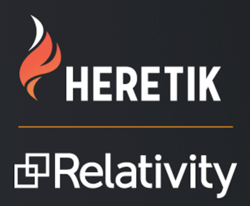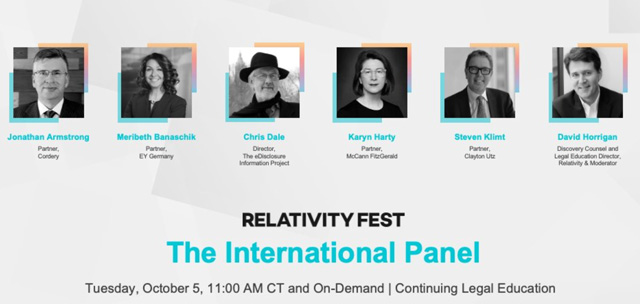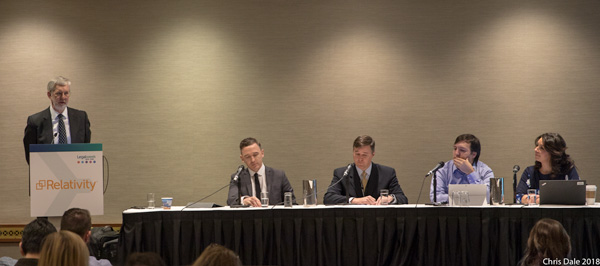As usual, these notes come out when I have collected enough to say rather than to a timetable. I publish today mainly because one subject referred to is an Oxford University webinar on The Role of AI in Judicial Determination (see below) which takes place tomorrow, 9 March.
Project Counsel Media, Maas Consulting Group and ComplexDiscovery form informational and educational partnership
Behind the corporate names in my heading, are three people I have known for many years. Project Counsel Media was founded by Greg Bufithis, who I first met at a Brussels event in, I think, 2008, and have been in touch with ever since. I have known Jonathan Maas of the Maas Consulting Group for more than three decades, the first person I met who understood the future of the relationship between litigation discovery and technology (and a user of the discovery software I wrote back at the dawn of time). Rob Robinson of ComplexDiscovery was the first and most reliable writer I came across when I began to be interested in US eDiscovery.
They have formed a partnership whose purpose is to expand and enhance their information and education roles. There is a press release here, and Caterina Conti of Project Counsel Media has written a post which explains more about the partnership.
This is a formidable team, and I look forward to seeing their combined output.
Relativity webinar: The e-Discovery Convergency: Your Role in the Combined World of Data Privacy, Data Protection, and Discovery
Relativity has a webinar on Thursday 11 March with the title The e-Discovery Convergency: Your Role in the Combined World of Data Privacy, Data Protection, and Discovery. The target audience is…well, anyone involved in eDiscovery , with a focus on ethical obligations as well as purely legal ones.
The speakers are Honorable Tanya R. Kennedy of the New York Supreme Court, Christa Haskins and Daniel Gold of BDO, and David Horrigan of Relativity. There is more information and a registration form here.
Automatic Justice: The Role of AI in Judicial Determination
The Faculty of Law at the University of Oxford is organising a Zoom talk on 9 March at 1:00pm called Automatic Justice: The Role of AI in Judicial Determination. The speaker is Mark Beer OBE, who I met through a commercial dispute resolution task force of which we are both members.
Mark Beer’s talk will look at the current use cases for AI in support of judicial decision making, and the direction of travel, and and will encourage debate about the possible future role of AI in dispute resolution.
There is more information and a registration form here.
Auto-Delete and Encrypted Messaging Apps: Next in the Regulatory Spotlight?
The subject of ephemeral messages came up in my last post, where its context was the recent Sedona Conference commentary on the subject. It recurred in an article by McCann FitzGerald called Auto-Delete and Encrypted Messaging Apps: Next in the Regulatory Spotlight?
The main theme of the article is the responsibility of organisations for communications which should be retained for regulatory purposes but which are designed to be automatically deleted or encrypted. As the article puts it:
the deletion of communications is always problematic in a regulatory environment and acquiescing in employees’ use of apps that automatically delete content may give rise to inferences which may be difficult to displace.
The article notes that Ireland is not the only jurisdiction trying to manage these issues. The UK’s FCA, for example, has made it clear that it expects such communications to be recorded and auditable.
The article makes some suggestions, with the conclusion that organisations need to understand how employees are communicating, and should develop procedures and training in line with regulators’ expectations.
Guide to eDiscovery in South Africa
LexisNexis South Africa has published the first text on eDicovery in Africa. A guide to eDiscovery in South Africa was written my old friend Terry Harrison and Ismail Hussain SC.
Terry Harrison was formerly one of London’s best-known providers of eDisclosure services and is much missed here. London’s loss is South Africa’s gain, and Terry has been tireless in his efforts to introduce to South Arica both an understanding of the principles and practice of eDiscovery and, by working with rule-makers, of the rules of court by reference to developments in other jurisdictions. The book covers data protection and privacy as they affect discovery, and also cross-border implications
Covid directions in Ireland COVID-19: Commercial Court Directs Fully Remote Witness Hearing Under New Statutory Powers
An article by McCann FitzGerald reports on adjustments made by the Irish Commercial Court for evidence to be given remotely. This was seen to raise constitutional issues as well as practical ones – problems included important requirements such as that justice must be administered in public.
As I understand it, the Commercial Court in England and Wales has successfully adapted to this aspect of lockdown, though an article in the Law Gazette headed Judges weary of Covid-related ‘excuses’ suggests diminishing tolerance of those who are seen as not helping that cause.
Nuix Global Regulator Report
Nuix has commissioned Ari Kaplan to uncover the best practices for financial and competition regulators around the world. The result is contained in the Nuix Global Regulator Report, written jointly by Ari Kaplan and Stuart Clarke of Nuix
The subjects covered in the report include:
- How do regulators choose which cases to investigate?
- What kind of warning can companies expect if they’re about to be investigated?
- What forms of enforcement do regulators use most often?
- Who makes best use of advanced technologies such as machine learning?
What the Bar can learn from US trial lawyers
There is an interesting article by Edward Henry QC on the Counsel website called
What the Bar can learn from US trial lawyers.
It begins with the author’s discovery, while staying in New York in 1993, that:
Here was something new! Advocacy could be taught. It was a craft. Skills could be imparted and one could practise and improve.
Edward Henry QC suggests that established ways of teaching advocacy are both outdated and unhelpful, that mimicking one’s elders is not necessarily helpful, and that overall case preparation and development of the “narrative” is more important than “force of personality and rhetorical fireworks”. He fears for the dilution and atrophy of our tradition of cross-examination.
Just to add to the sense that this post is really about everyone I knew several decades ago (Bufithis, Maas, Robinson, Harrison), I actually met Edward Henry long before I knew any of the others, before I left practice as a solicitor and before he went to the bar. Keep your friendships warm.
Moving the Civil Procedure Rules
The UK government has been messing around with every government website, moving them all to the GOV.UK site or inflicting other “improvements” designed more for their convenience than for yours or mine.
The usual form is that the job is given to a teenager who bunked off from the web design course at college and quickly landed a job with the government – perhaps daddy was a Facebook friend with Health Minister Matt Hancock, who gives multi-million (or billion) contracts to his mates, or Robert “Nine Bob Note” Jenrick, of whom the less said the better in this context.
I digress. The yoof plays around for a few weeks, then one day transfers the whole site to a new location. It will probably be in colour and in big type. It will almost certainly be useless for the purpose, having had no input from any user. This happened one morning with the Civil Procedure Rules, whose online version is used constantly by those needing, for example, to check a point urgently or perhaps give a reference to the court. It was a shambles of the kind we have come to expect from the Ministry of Justice.
To his credit, the then Parliamentary Under Secretary of Sate, Lord Wolfson, not only instigated an investigation, but actually tweeted that he had done so. Shortly afterwards, the old site was restored in its former position pending (I hope) a redesign by someone competent, and consultation, however informal, with at least a solicitor, a barrister and a judge.
The Snow Moon
The main photographic event since my last post was the appearance of the Snow Moon. There is something special about being able to take such a picture by just stepping outside my front door.

Home
 All that is a long way of saying that Relativity Fest London, on 16 May, was my first eDiscovery event since the end of 2019. Events always used to mean hours of work in advance. Preparation this time involved finding a pair of dusty Loakes at the back of a cupboard and giving them a polish.
All that is a long way of saying that Relativity Fest London, on 16 May, was my first eDiscovery event since the end of 2019. Events always used to mean hours of work in advance. Preparation this time involved finding a pair of dusty Loakes at the back of a cupboard and giving them a polish.























